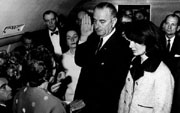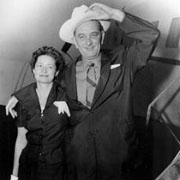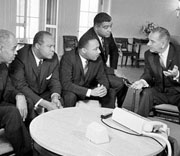-
(单词翻译:双击或拖选)
THE MAKING OF A NATION - American History: Lyndon Johnson Becomes President
STEVE EMBER: Welcome to THE MAKING OF A NATION – American history in VOA Special English. I’m Steve Ember.
This week in our series, we begin the story of President Lyndon Johnson.
(MUSIC)
WALTER CRONKITE (CBS TV): “From Dallas Texas, the flash, apparently1 official, President Kennedy died at 1 PM Central Standard Time, two o’clock Eastern Standard Time.
Lyndon Baines Johnson became America's thirty-sixth president suddenly.
WALTER CRONKITE: “Vice2 President Lyndon Johnson has left the hospital in Dallas. Presumably, he will be taking the oath of office shortly, and become the thirty-sixth President of the United States.”
On November twenty-second, nineteen sixty-three, President John Kennedy was murdered.
 |
| Lyndon Johnson is sworn in as president with Jacqueline Kennedy at his side hours after her husband's murder in Dallas |
Kennedy and Johnson, his vice president, were in Dallas, Texas. Kennedy was shot as his open car drove through the city. Within a few hours, Johnson was sworn into office. The swearing-in took place on the presidential plane, Air Force One, at Dallas’ Love Field.
The plane returned to Andrews Air Force Base near Washington carrying the new president and the body of the former president.
At Andrews, President Johnson read a brief statement. He ended with these words: "I will do my best. That is all I can do. I ask for your help, and God's."
(MUSIC)
Before he was vice president, LBJ had served for many years in the Senate and the House of Representatives. He grew up in small towns in Texas. He finished high school at age fifteen. He traveled and worked for a few years before he entered Southwest Texas State Teachers College. There he was a student leader and a political activist3.
In nineteen thirty-one a newly elected congressman4 asked Johnson to work for him as his secretary in Washington. Four years later, President Franklin Roosevelt appointed Johnson as Texas director of Roosevelt's National Youth Administration.
 |
| Senator Lyndon Johnson with his wife, Lady Bird, before flying to their home in Texas from Washington on August 25, 1955 |
Two years after that, in nineteen thirty-seven, Johnson won a special election for a seat in the House of Representatives. He served in the House for twelve years. When the United States entered World War Two, Johnson was the first member of Congress at that time to volunteer for active duty. After the war, he ran for the Senate, where he also served for twelve years.
Johnson loved politics and became an expert in the operations of government. He would need all of that knowledge as president of a nation facing problems near and far.
(SOUND: Vietnam War gunfire)
When Johnson took office, communist forces were fighting South Vietnamese troops supported by the United States. Also there were continuing worries about nuclear war with the Soviet5 Union. At home, there was racial conflict. Many Americans were out of work, and there was the threat of a railroad strike.
Johnson began his presidency6 by working hard for legislation that President Kennedy had proposed. Johnson had voted against civil rights legislation when he served in the Senate. But now he urged Congress to support the idea, and Congress agreed.
The nineteen sixty-four Civil Rights Act barred discrimination against minorities in jobs and in restaurants and other businesses.
LYNDON JOHNSON: "We believe that all men are created equal. Yet many are denied equal treatment. We believe that all men have certain unalienable rights. Yet many Americans do not enjoy those rights. We believe that all men are entitled to the blessings7 of liberty. Yet millions are being deprived of those blessings -- not because of their own failures -- but because of the color of their skin."
The president said that such a situation could not continue in America. To treat people unfairly because of their race, he said, violated the Constitution and the idea of democracy.
Lyndon Johnson succeeded in getting Congress to pass more civil rights legislation in nineteen sixty-five and sixty-eight.
LYNDON JOHNSON: “Many of the issues of civil rights are very complex and most difficult. But about this there can -- and should be -- no argument. Every American citizen must have an equal right to vote... There is no reason that can excuse the denial of that right. There is no duty which weighs more heavily on us than the duty we have to ensure that right.”
Many southern states used so-called literacy tests as a way to deny blacks the right to vote.
LYNDON JOHNSON: “The Negro citizen may go to register only to be told that the day is wrong, or the hour is late, or the official in charge is absent. And if he persists and, if he manages to present himself to the registrar8, he may be disqualified because he did not spell out his middle name, or because he abbreviated9 a word on the application.
 |
| President Johnson talks with civil rights leaders, from left, Roy Wilkins, James Farmer, Dr. Martin Luther King Junior and Whitney Young at the White House in January 1964 |
“And if he manages to fill out an application, he is given a test. The registrar is the sole judge of whether he passes this test. He may be asked to recite the entire Constitution, or explain the most complex provisions of state law.
And even a college degree cannot be used to prove that he can read and write.”
The Civil Rights Act of nineteen sixty-five said states could not prevent citizens from voting just because they could not read very well.
The nineteen sixty-eight law barred discrimination against blacks in housing.
Johnson was from the South. That -- and his ability to persuade people -- helped him get southern conservatives in Congress to support the civil rights legislation.
He also had other ideas for a better America. He called his plan the Great Society. He talked about it in a speech at the University of Michigan:
LYNDON JOHNSON: "The Great Society rests on abundance and liberty for all. It demands an end to poverty and racial injustice10, to which we are totally committed in our time. But that is just the beginning. The Great Society is a place where every child can find knowledge to enrich his mind and to enlarge his talents."
Johnson launched the War on Poverty, a series of bills designed to help the poor. But his efforts to pay for social programs and a war overseas led to inflation.
Vietnam was not the only place where Johnson used military force. In nineteen sixty-five he sent more than twenty thousand troops to intervene in the Dominican Republic. He worried that a revolution could lead to a communist takeover of that Caribbean nation.
(MUSIC)
Lyndon Johnson served the last fourteen months of President Kennedy's term. Then in nineteen sixty-four he ran for a full term. The Democratic Party strongly supported him and accepted his choice of Hubert Humphrey for vice president. Humphrey was a liberal senator from the state of Minnesota.
Unlike the Democrats11, the Republicans had a difficult time choosing their presidential candidate. Delegates at the party's nominating convention finally chose Barry Goldwater. Goldwater was a strongly conservative senator from Arizona.
BARRY GOLDWATER: “Certainly, simple honesty is not too much to demand of men in government. And let our Republicanism, so focused and so dedicated12, not be made fuzzy and futile13 by unthinking and stupid labels. I would remind you that extremism in the defense14 of liberty is no vice. And let me remind you also that moderation in the pursuit of justice is no virtue15.”
The Republican candidate for vice president was William Miller16, a congressman from New York State.
Americans voted in November of nineteen sixty-four. Lyndon Johnson won more than sixty percent of the popular vote. Still he had hoped for an even bigger victory. He wanted proof that Americans were voting for him, and not the shadow of John Kennedy.
In his inaugural17 speech, Johnson said his Great Society would never be finished -- it would keep growing and improving.
LYNDON JOHNSON: “I do not believe that the Great Society is the ordered, changeless and sterile18 battalion19 of the ants. It is the excitement of becoming -- always becoming, trying, probing, falling, resting and trying again -- but always trying and always gaining."
In nineteen sixty-five, he won congressional approval of Medicare, a health insurance program for Americans age sixty-five and older. President Harry20 Truman had called for such a plan twenty years earlier. Johnson presented Truman and his wife, Bess, with Medicare cards numbers one and two. Under Johnson, Congress also approved Medicaid, a health care program for the poor and disabled.
In nineteen sixty-seven, President Johnson appointed the nation's first black justice to the Supreme21 Court, Thurgood Marshall.
ANTI-WAR DEMONSTRATORS: “Hell no, we won’t go!”
Around the country, President Johnson faced growing opposition22 to the war in Vietnam. More and more American troops were dying.
Lyndon Johnson may have wanted to be remembered as a great president, but the war came to redefine his presidency. That will be our story next week.
(MUSIC)
You can find our series online with transcripts23, MP3s, podcasts and pictures at voanews.cn. You can also follow us on Facebook and Twitter at VOA Learning English. I’m Steve Ember, inviting24 you to join us again next week for THE MAKING OF A NATION -- American history in VOA Special English.
___
Contributing: Jerilyn Watson
This was program #212. For earlier programs, type "Making of a Nation" in quotation25 marks in the search box at the top of the page.
 收听单词发音
收听单词发音
1
apparently

|
|
| adv.显然地;表面上,似乎 | |
参考例句: |
|
|
|
2
vice

|
|
| n.坏事;恶习;[pl.]台钳,老虎钳;adj.副的 | |
参考例句: |
|
|
|
3
activist

|
|
| n.活动分子,积极分子 | |
参考例句: |
|
|
|
4
Congressman

|
|
| n.(美)国会议员 | |
参考例句: |
|
|
|
5
Soviet

|
|
| adj.苏联的,苏维埃的;n.苏维埃 | |
参考例句: |
|
|
|
6
presidency

|
|
| n.总统(校长,总经理)的职位(任期) | |
参考例句: |
|
|
|
7
blessings

|
|
| n.(上帝的)祝福( blessing的名词复数 );好事;福分;因祸得福 | |
参考例句: |
|
|
|
8
registrar

|
|
| n.记录员,登记员;(大学的)注册主任 | |
参考例句: |
|
|
|
9
abbreviated

|
|
| adj. 简短的,省略的 动词abbreviate的过去式和过去分词 | |
参考例句: |
|
|
|
10
injustice

|
|
| n.非正义,不公正,不公平,侵犯(别人的)权利 | |
参考例句: |
|
|
|
11
democrats

|
|
| n.民主主义者,民主人士( democrat的名词复数 ) | |
参考例句: |
|
|
|
12
dedicated

|
|
| adj.一心一意的;献身的;热诚的 | |
参考例句: |
|
|
|
13
futile

|
|
| adj.无效的,无用的,无希望的 | |
参考例句: |
|
|
|
14
defense

|
|
| n.防御,保卫;[pl.]防务工事;辩护,答辩 | |
参考例句: |
|
|
|
15
virtue

|
|
| n.德行,美德;贞操;优点;功效,效力 | |
参考例句: |
|
|
|
16
miller

|
|
| n.磨坊主 | |
参考例句: |
|
|
|
17
inaugural

|
|
| adj.就职的;n.就职典礼 | |
参考例句: |
|
|
|
18
sterile

|
|
| adj.不毛的,不孕的,无菌的,枯燥的,贫瘠的 | |
参考例句: |
|
|
|
19
battalion

|
|
| n.营;部队;大队(的人) | |
参考例句: |
|
|
|
20
harry

|
|
| vt.掠夺,蹂躏,使苦恼 | |
参考例句: |
|
|
|
21
supreme

|
|
| adj.极度的,最重要的;至高的,最高的 | |
参考例句: |
|
|
|
22
opposition

|
|
| n.反对,敌对 | |
参考例句: |
|
|
|
23
transcripts

|
|
| n.抄本( transcript的名词复数 );转写本;文字本;副本 | |
参考例句: |
|
|
|
24
inviting

|
|
| adj.诱人的,引人注目的 | |
参考例句: |
|
|
|
25
quotation

|
|
| n.引文,引语,语录;报价,牌价,行情 | |
参考例句: |
|
|
|















